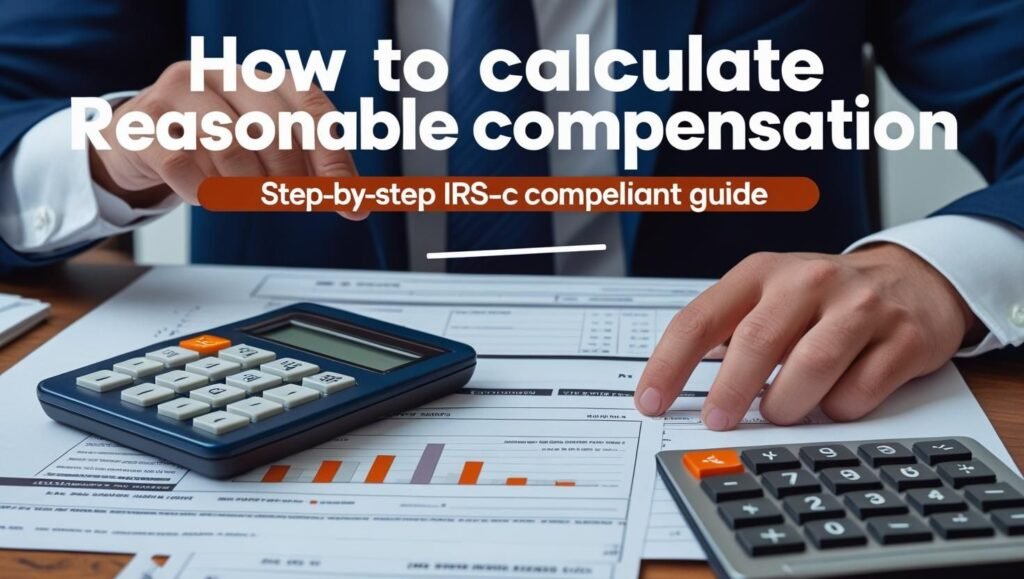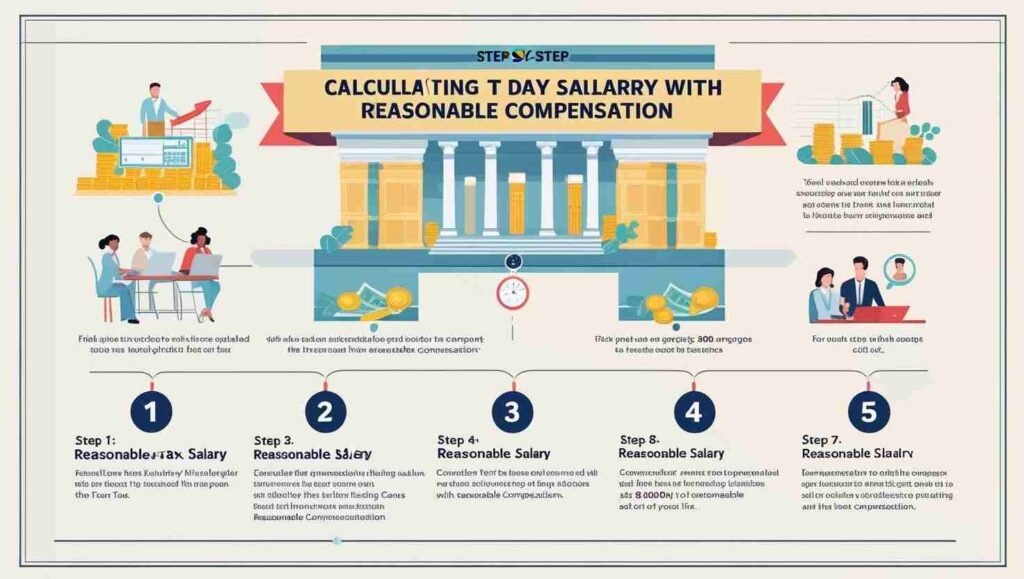Calculating reasonable compensation is a vital task for S-corporation owners to ensure compliance with IRS regulations and optimize tax strategies. Setting a fair salary can seem daunting, but with the right approach, you can determine a salary that aligns with industry standards and IRS expectations. This step-by-step guide simplifies the process, helping you avoid costly mistakes and streamline your compensation planning.
What is Reasonable Compensation?
Reasonable compensation is the salary an S-corp owner pays themselves for services rendered, comparable to what similar businesses pay for similar roles. As explained in our article, What is Reasonable Compensation for S-Corporation Owners?, this salary is subject to payroll taxes, unlike distributions, which are only taxed as income. Setting it correctly ensures IRS compliance and tax savings.

Why Calculating It Correctly Matters
An accurate salary prevents IRS audits, which can reclassify distributions as wages, leading to additional taxes and penalties. It also allows you to balance salary and distributions to minimize payroll taxes while maximizing tax-free distributions. For example, setting a reasonable salary of $60,000 instead of $30,000 could save you from penalties while still reducing payroll taxes compared to a higher salary.
Methods for Calculating Reasonable Compensation
Several methods can help determine a fair salary:
- Market Comparisons: Research salaries for similar roles in your industry and location.
- Industry Standards: Use sector-specific salary surveys or reports.
- Online Tools: Leverage calculators like the Reasonable Compensation Calculator for tailored estimates.
Key Factors to Consider
The IRS evaluates reasonable compensation based on factors such as:
- Your training and experience
- Duties and responsibilities
- Time and effort devoted to the business
- Dividend history of the corporation
- Payments to non-shareholder employees
- Comparable business salaries for similar services
- Formal compensation agreements
These factors ensure your salary reflects the value of your services.
Step-by-Step Guide to Calculating Your Salary
Follow these steps to determine your reasonable compensation:

- Identify Your Role: Define your primary role (e.g., CEO, IT consultant, marketing manager).
- Research Salary Data: Use reliable sources to find salary ranges for your role. Recommended resources include:
- Bureau of Labor Statistics (BLS): Detailed wage data for over 800 occupations.
- Glassdoor: User-submitted salary data by role and location.
- Salary.com: Comprehensive salary benchmarks.
- PayScale: Customizable salary reports.
- RCReports: Specialized reasonable compensation analysis.
- Adjust for Business Specifics: Consider your business’s profitability, hours worked, and whether profits stem from your labor or assets. For example, part-time work may justify a lower salary.
- Set Your Salary: Choose a salary within the researched range, ensuring it’s defensible to the IRS.
- Document Your Decision: Save salary data, job descriptions, and reasoning to support your choice in case of an audit.
Example Calculation
Imagine you own an S-corp providing IT consulting services, acting as the lead consultant and project manager. Here’s how you might calculate your salary:
- Role: Lead IT Consultant/Project Manager.
- Salary Research: BLS reports a median salary of $151,150 for computer and information systems managers, while Glassdoor shows $120,000 for IT project managers in your area.
- Adjustments: Your business is smaller, with $200,000 in annual profits, and you work full-time.
- Salary Set: You choose $100,000, below the BLS median but reasonable given your business size.
- Documentation: Save BLS and Glassdoor data, noting your business’s revenue and full-time role.
This approach ensures compliance while optimizing tax savings.
Common Mistakes to Avoid
- Using Arbitrary Rules: Avoid formulas like the 60/40 split (60% salary, 40% distributions), as they may not align with IRS standards.
- Setting Salary Too Low: A salary significantly below market rates risks IRS reclassification.
- Skipping Documentation: Lack of records can weaken your defense in an audit.
For more on avoiding IRS scrutiny, read Avoiding IRS Penalties: Ensuring Your Compensation is Reasonable.
Simplify with Our Calculator
Calculating reasonable compensation can be time-consuming, but our Reasonable Compensation Calculator simplifies the process. By entering your role, industry, and business details, you’ll get a tailored salary estimate that aligns with IRS guidelines.
External Resources
- IRS: S Corporation Compensation and Medical Insurance Issues
- BLS Wage Data
- Glassdoor Salary Information
- Salary.com
- PayScale
- RCReports
Conclusion
By following this step-by-step guide, you can calculate a reasonable compensation that ensures IRS compliance and optimizes your tax strategy. Use reliable data sources and our calculator to make the process easier and more accurate, giving you confidence in your financial decisions.